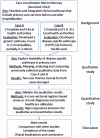Disease-specific clinical pathways - are they feasible in primary care? A mixed-methods study
- PMID: 29644927
- PMCID: PMC6066276
- DOI: 10.1080/02813432.2018.1459167
Disease-specific clinical pathways - are they feasible in primary care? A mixed-methods study
Abstract
Objective: To explore the feasibility of disease-specific clinical pathways when used in primary care.
Design: A mixed-method sequential exploratory design was used. First, merging and exploring quality interview data across two cases of collaboration between the specialist care and primary care on the introduction of clinical pathways for four selected chronic diseases. Secondly, using quantitative data covering a population of 214,700 to validate and test hypothesis derived from the qualitative findings.
Setting: Primary care and specialist care collaborating to manage care coordination.
Results: Primary-care representatives expressed that their patients often have complex health and social needs that clinical pathways guidelines seldom consider. The representatives experienced that COPD, heart failure, stroke and hip fracture, frequently seen in hospitals, appear in low numbers in primary care. The quantitative study confirmed the extensive complexity among home healthcare nursing patients and demonstrated that, for each of the four selected diagnoses, a homecare nurse on average is responsible for preparing reception of the patient at home after discharge from hospital, less often than every other year.
Conclusions: The feasibility of disease-specific pathways in primary care is limited, both from a clinical and organisational perspective, for patients with complex needs. The low prevalence in primary care of patients with important chronic conditions, needing coordinated care after hospital discharge, constricts transferring tasks from specialist care. Generic clinical pathways are likely to be more feasible and efficient for patients in this setting. Key points Clinical pathways in hospitals apply to single-disease guidelines, while more than 90% of the patients discharged to community health care for follow-up have multimorbidity. Primary care has to manage the health care of the patient holistically, with all his or her complex needs. Patients most frequently admitted to hospitals, i.e. patients with COPD, heart failure, stroke and hip fracture are infrequent in primary care and represent a minority among patients in need of coordinated community health care. In primary care, the low rate of receiving patients discharged from hospitals of major chronic diseases hampers maintenance of required specific skills, thus constricting the transfer of tasks to primary care. Generic clinical pathways are suggested to be more feasible than disease-specific pathways for most patients with complex needs.
Keywords: Health service research; care coordination; general practice; home health nursing; integrated care; multimorbidity; practice guideline.
Figures
References
-
- Rotter T, Kinsman L, James E, et al. . Clinical pathways: effects on professional practice, patient outcomes, length of stay and hospital costs. Cochrane Database Syst Rev. 2010;35:CD006632. - PubMed
-
- Shepperd S, Lannin NA, Clemson LM, et al. . Discharge planning from hospital to home. Cochrane Database Syst Rev. 2013;1:CD000313. - PubMed
-
- St. meld. nr. 47 (2008–2009). The Coordination Reform. Proper treatment – at the right place and right time (English summary of the white paper). Oslo: Norwegian Ministry of Health and Care Services; 2009.
MeSH terms
LinkOut - more resources
Full Text Sources
Other Literature Sources
Medical

